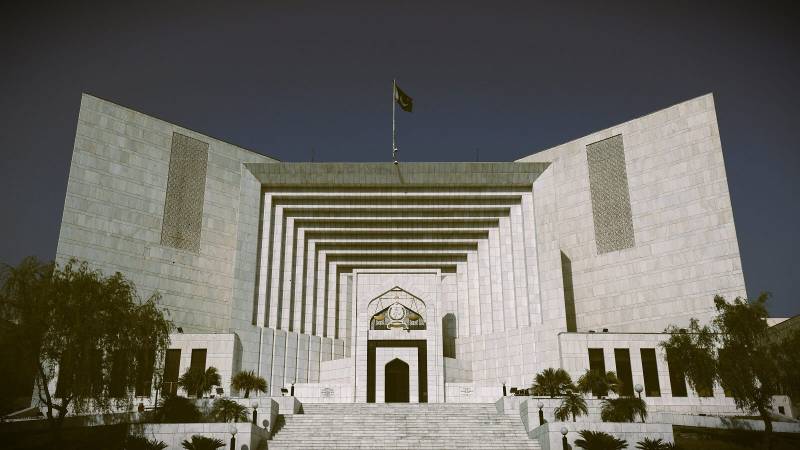
In a crucial decision, the Supreme Court on Monday ruled that citizens have a right to information of 'public importance' about the top court. However, it ruled that this information cannot be sought under the Right to Information (RTI) Act - an act of Parliament - rather, since the top court is not excluded from the purview of Article 19A of the Constitution - because the top court is also a constitutional body - information can be sought under the relevant clause of the Constitution.
It, thus, allowed an information request, which had been filed four years ago by a citizen, Mukhtar Ahmed. The court subsequently directed its Registrar's Office to provide the citizen with details sought within seven days.
The verdict was issued by Chief Justice Qazi Faez Isa, who was heading a three-judge bench. Earlier, the court had reserved its judgment on an appeal filed after the court's registrar had turned down an application seeking details about the Supreme Court.
Mukhtar Ahmed had sought details about the sanctioned strength of staff at the Supreme Court from pay scale one to 22, total vacancies, vacant posts, number of daily wagers and contractual employees, number and types of positions created anew since January 1, 2017, total numbers of female staff, specially-abled people, total people who are transgender working with the SC as staff member and a certified copy of the latest approved Service Rules of SC.
When former registrar Jawad Paul refused to provide the information to Ahmed, he approached the Pakistan Information Commission (PIC), which issued an order in his favour.
However, the registrar, through the then chief justice, had asked the Attorney General of Pakistan to challenge the PIC order before the Islamabad High Court (IHC). After multiple rounds of litigation in the IHC, the matter landed in the Supreme Court.
On Monday, Chief Justice Qazi Faez Isa issued a ten-page judgement on the appeal.
Justice Athar Minallah, who was part of the three-member bench hearing the case, agreed with the observations of the chief justice and the ruling, authoring an additional note in the judgment.
The judgement read that Article 19-A stipulates that information should be provided subject to regulation and reasonable restrictions imposed by law.
"However, there is no law which attends to the Supreme Court in this regard, nor has the Supreme Court itself made any regulations," the judgement observed.
"Needless to state that if a law is enacted and/or regulations made, requests for information would be attended to in accordance therewith and in accordance with Article 19A."
"In the present case, there is no reason why the information sought by the petitioner should not be provided, nor can the provision of such information be categorized as being contrary to the public interest."
The chief justice observed, "Consequently, the information sought by the petitioner should have been provided to him."
Chief Justice Isa's judgment quoted examples from Islamic history to support his view about transparency.
"High standards were set in early Islam, and those governing had to provide information. The second caliph, Hazrat Umar bin Al-Khattab (may Allah be pleased with him), was questioned about the quantity of material used in the making of his shirt; he did not object to being questioned and told his son, Abdullah bin Umar, to explain, who said that in view of his father’s large size, extra material which was used to make his shirt was given by him," the judgment stated.
"Transparency brings with it the added benefit of introspection, which benefits institutions by promoting self-accountability," the judgement read.
The judgment made it clear that the top court is not excluded from the purview of Article 19A of the Constitution, and information of ‘public importance’ can be sought thereunder.
"What previously may have been on a need-to-know basis Article 19A of the Constitution has transformed it to a right-to-know."
"The burden has shifted from those seeking information to those who want to conceal
it."
"Access to information is no longer a discretion granted through occasional benevolence, but is now a fundamental right available with every Pakistani which right may be invoked under Article 19A of the Constitution."
The judgement added, "We may observe that it is only when citizens have access to the requisite information can they meaningfully question those paid from the public exchequer, and who are meant to serve their interests."
Regarding the registrar's actions to initiate legal proceedings against the PIC's ruling through the Attorney General for Pakistan, the top court observed that the top court's rules do not grant the registrar specific powers to initiate such litigation.
"Though the chief justice may assign ‘any function required by the rules to be performed by the Registrar’, the Rules do not require, nor envisage, initiating litigation."
Therefore, the top court ruled that the registrar could not be given this responsibility, nor could he undertake it.
The top court further observed that the attorney general attends to the matters of the federal government, which is part of the executive and mandated to be separate from the judiciary.
"The instant matter concerned the Supreme Court and had no concern with the federal government," the top court observed.

